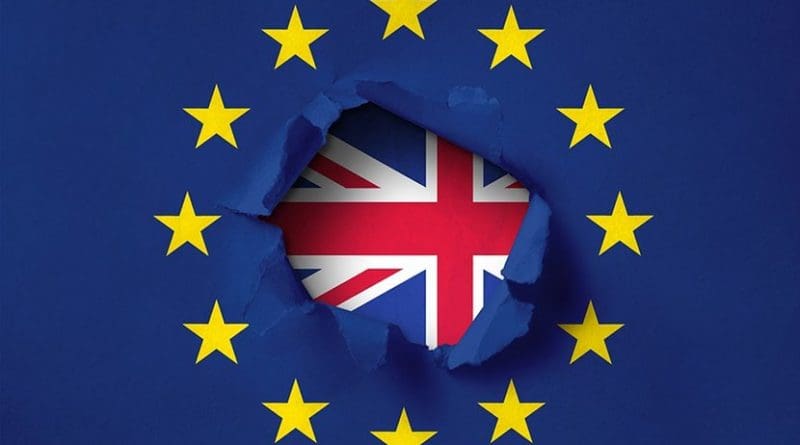Time Has Come For UK To Revisit Its Ties With The EU – OpEd
By Arab News
By Mohamed Chebaro*
I do not believe politics will change in the UK anytime soon, despite the shift in the public mood, which has been leaning toward believing that Brexit was the wrong step for the national interests of the country, its unity, economic prosperity and social cohesion.
No one is talking here about abandoning Brexit all together and rejoining the EU, but at least some sanity might have emerged within parts of the country and the Conservative Party leadership, which has hinted that trying to recover some of the billions of pounds the UK has lost as a result of its hard Brexit might not be that bad an idea after all.
Brexit-supporting Prime Minister Rishi Sunak had to appease his party when he told business leaders this week that life outside the EU was “delivering enormous benefits and opportunities.” But many of those in attendance and the rest of the country question what the Conservative PM, ministers and MPs mean when they make such statements. To date, none of the Conservative advocates of Brexit have succeeded in pointing to any such benefits and opportunities, which is the elephant in the room that no one in government dares mention.
Sunak’s comments followed a Sunday Times report that “senior government figures” were planning to “put Britain on the path toward a Swiss-style relationship” with the EU. Switzerland has far closer ties with the bloc through bilateral agreements that allow it access to the single market and a high degree of free movement through paying into EU coffers.
Previously, Chancellor Jeremy Hunt, himself a Remainer, had spooked the euroskeptics in his party when he said he was eager to remove the “vast majority” of trade barriers with the EU. Hunt, who managed to rebalance the books and calm the financial markets after Liz Truss’ disastrous mini-budget of cutting taxes and borrowing money to stimulate growth, was not speaking from the void, as polls and experts have been indicating a cooling of attitudes in the UK toward the validity of Brexit.
For a start, recent polls have shown that public opposition has grown to the hard form of Brexit pursued by successive Conservative governments since British voters opted by a 52-48 margin to leave the bloc in a 2016 referendum. According to polling expert John Curtice, 57 percent of people would vote to rejoin the bloc and 43 percent to stay out if a new referendum were to be held.
The divorce deal struck by the UK and the EU in 2020 has brought customs checks and other border hurdles for goods, along with passport checks and other annoyances for travelers.
With inflation at its highest rate for decades and amid forecasts of potentially the longest ever recession in the country, a YouGov poll last week suggested 56 percent of people in Britain now think it was wrong to leave the EU. Some 32 percent, however, are still in favor.
A recent assessment by the Office for Budget Responsibility, the UK’s respected spending watchdog, which stated that Brexit has had a “significant adverse impact” on trade, might have played a role in these polls, especially since it was followed by comments by the Bank of England and business leaders blaming Brexit for reducing overall trade volumes and denting trading relationships with the EU.
The problem with the Conservative Party’s leaders is that they do not want to own up to anything. From their small state and austerity plan that has harmed the country since 2010 to the referendum to leave the EU, which threw the country into a period of unprecedented political chaos, leading it to change four prime ministers since 2019 and have four finance ministers in the last year alone. From the abstract meaning of their motto of “Take Back Control” to the total lack of vision as to how they wanted to build a “Singapore on Thames,” not to mention of course nearly exploding the economy with a “fairy-tale” mini-budget that badly dented the hard-earned position of the UK as a key investment destination.
The Conservative government and its supporters prefer to blame the current recession on global forces and say that it was “made in Russia,” while people are facing the brunt of the cost-of-living crisis with weakened public services and a starved health sector due to years of governing by a party whose sole aim was to get the UK out of the EU, without a vision of what to do on the day after.
The Conservatives do not want to admit that Brexit has been a factor that has “contributed to 4% productivity drop, 15% trade drop, 6% food price increase, lower wages, workforce shortages & highest inflation in G7,” as the Green Party MP Caroline Lucas tweeted recently.
No one, of course, could discount the impact of COVID-19 or the Russian invasion of Ukraine, but the Tory Brexit has been a major cause of Britain’s recent economic woes, as confirmed by statistics released this week that show that, compared to pre-pandemic levels, the US has recorded more than 4 percent in growth and the eurozone is at 2.1 percent, while the UK’s economy has shrunk by 0.4 percent.
I think the country deserves a sane discussion, away from the boosterism and lying of the Boris Johnson era, that could ultimately admit that Brexit started with many lies and the shortest route to putting things right might, unfortunately, require a review of hard Brexit and the consideration of a Swiss-style arrangement or a Norwegian one with the UK’s closest trading partner and neighbor, the EU.
- Mohamed Chebaro is a British-Lebanese journalist, media consultant and trainer with more than 25 years of experience covering war, terrorism, defense, current affairs and diplomacy.

